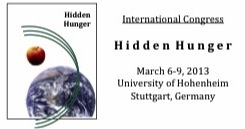 STUTTGART, Germany – Around 300 scientists and experts from around the world converged to focus on the causes, consequences, and counter-strategies of the global problem on micronutrient deficiencies during early development, also known as "Hidden Hunger." Organized by the University of Hohenheim (UHOH), the 2nd Hidden Hunger International Congress was held in Stuttgart, Germany on 3-6 March 2015.
STUTTGART, Germany – Around 300 scientists and experts from around the world converged to focus on the causes, consequences, and counter-strategies of the global problem on micronutrient deficiencies during early development, also known as "Hidden Hunger." Organized by the University of Hohenheim (UHOH), the 2nd Hidden Hunger International Congress was held in Stuttgart, Germany on 3-6 March 2015.
Among the participants were Philippine delegates Dr. Normahitta P. Gordoncillo, Director of the Institute of Human Nutrition and Food, College of Human Ecology, University of the Philippines Los Baños and SEARCA graduate alumna (MS applied nutrition, 1988) and Dr. Maria Cristeta N. Cuaresma, SEARCA’s Program Head of the Graduate Education and Institutional Development. The Congress was immediately followed by the Food Security Center (FSC) planning meeting which was attended by Dr. Cuaresma.
Professor Hans K. Biesalski, Head of the Institute of Biological Chemistry and Nutrition and FSC Director, served as the overall chair of the Congress. In his welcome address, Prof. Biesalski talked about "Hidden Hunger" as a form of chronic malnutrition, with potential negative consequences on long-term health. Referring to the lack of essential vitamins and minerals necessary for proper growth and development, such as Vitamin A, iron, iodine, and zinc, Hidden Hunger affects health, long before malnutrition becomes obvious.
The Congress had six sub-themes: (1) State of malnutrition in high-income countries, and evidences; (2) Micronutrient deficiencies within the first 1000-day-window in high income countries; (3) Nutrition transition and nutritional deficiencies in low-income countries; (4) Reasons for Hidden Hunger; (5) Consequences of Hidden Hunger; and (6) Interventions to improve nutrition security from the perspectives of various sectors.
Addressing the links and gaps between science and reality in all parts of the world, panel discussions with participants representing both high and low-income countries followed the lectures of the experts. The conference also brought together various disciplines, thus allowing discussions on Hidden Hunger from the perspectives of nutrition, medicine, to the social sciences, economics, and agriculture. As a whole, the Congress was a reiteration of support to the First 1000 Days Initiatives in recognition of the critical period for growth and development with great implications in the latter years.
The irony of being obese yet hungry because of consuming food with too much calories and little micronutrients became a subject of contention regardless of being in a high or low-income country. At the same time, the double burden of malnutrition (having both stunting, wasting, and obesity) pose a challenge to the many experts who recognize the scarcity of resources in public health interventions. The Congress also observed exchanges reflecting differing opinions on the value of immediate food fortification, and of supplementation versus long- term solutions requiring behavioural change, movements in the food production system, only to be convinced that both are not necessarily exclusive of each other.
The insightful inputs at the Congress include emphasis on the overarching need to translate nutrient needs into food-based dietary goals. Dr. Nicole Darmon, a nutritionist and an epidemiologist from the French National Research Institute for Agriculture, stirred the audience with her question, "Do healthy, yet expensive foods always mean nutritious food?" in her presentation titled "Food price policies improve diet quality while increasing socioeconomic inequalities in nutrition." Dr. Craig Gundersen, professor in Agricultural Strategy in the Department of Agricultural and Consumer Economics at the University of Illinois, was emphatic on the importance of measuring food and nutrition insecurity amidst countries in nutrition transition where food insecurity and obesity co-exist. Dr. Keith West, a professor of Infant and Child Nutrition and the Director of the Center for Human Nutrition at the John Hopkins Bloomberg School of Public Health in Baltimore Maryland, opined that a lot of congenital disorders, which used to be explained by gene effects, are now actually nutrition-environment related.
Given the build-up of interesting concepts, shared evidences, and bright solutions, the Congress topped it with a challenge on how to streamline ideas into doable action points. The Congress made it clear that growing more food alone is not enough to end Hidden Hunger. As a research fellow emeritus with the International Food Policy Research Institute Klaus von Grebmer puts it, making Hidden Hunger visible through effective communication can certainly be the first step.









